Analyzing the Evolution of Journalism: Historical Context and Impact
VerifiedAdded on 2022/09/27
|8
|1147
|19
Essay
AI Summary
This essay provides a comprehensive analysis of the evolution of journalism, tracing its transformation from the Age of Enlightenment to the present era. It explores three pivotal stages: the rise of journalism as the Fourth Estate, its role in fostering investigative journalism and influencing legislation, and its function as a court of last resort in safeguarding citizens' rights. The paper examines how journalism has expanded its scope and influence, shaping public opinion and contributing to democratic societies. The essay highlights key historical developments and their lasting impact on journalistic practices, emphasizing the importance of preserving significant journalism for future generations. The analysis draws on historical context to illustrate the crucial role of journalism in modern society and its continuing evolution.
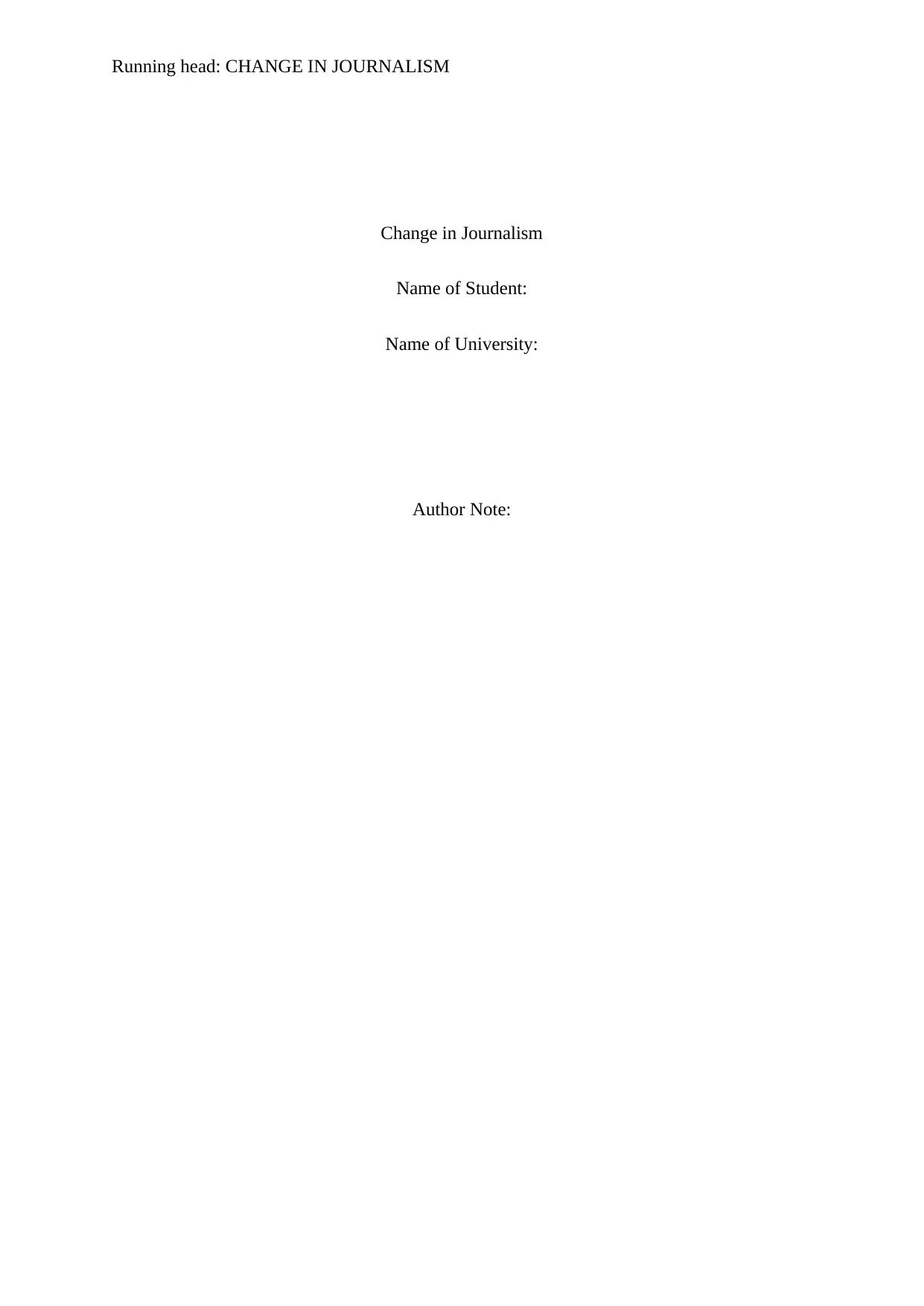
Running head: CHANGE IN JOURNALISM
Change in Journalism
Name of Student:
Name of University:
Author Note:
Change in Journalism
Name of Student:
Name of University:
Author Note:
Paraphrase This Document
Need a fresh take? Get an instant paraphrase of this document with our AI Paraphraser
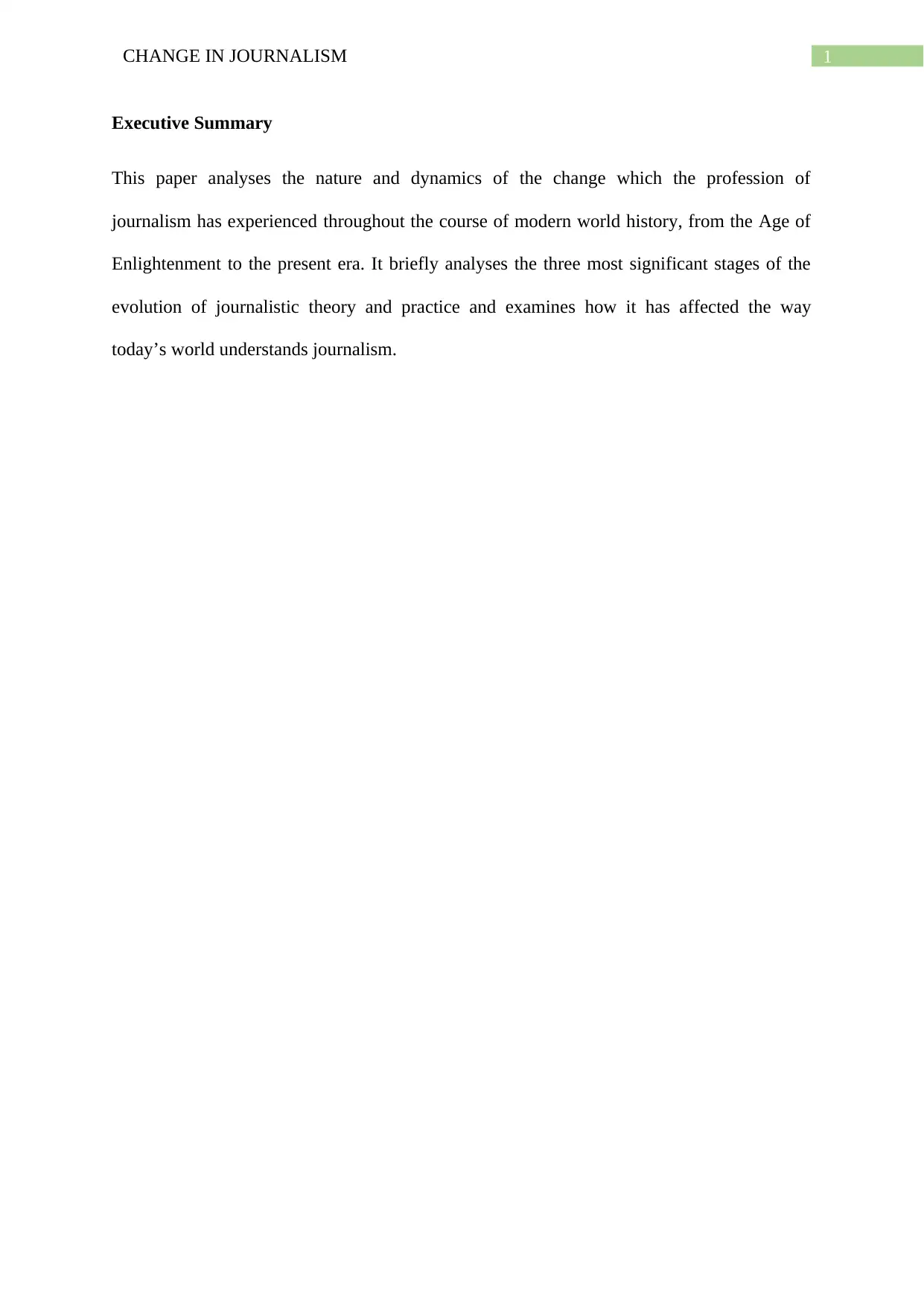
1CHANGE IN JOURNALISM
Executive Summary
This paper analyses the nature and dynamics of the change which the profession of
journalism has experienced throughout the course of modern world history, from the Age of
Enlightenment to the present era. It briefly analyses the three most significant stages of the
evolution of journalistic theory and practice and examines how it has affected the way
today’s world understands journalism.
Executive Summary
This paper analyses the nature and dynamics of the change which the profession of
journalism has experienced throughout the course of modern world history, from the Age of
Enlightenment to the present era. It briefly analyses the three most significant stages of the
evolution of journalistic theory and practice and examines how it has affected the way
today’s world understands journalism.
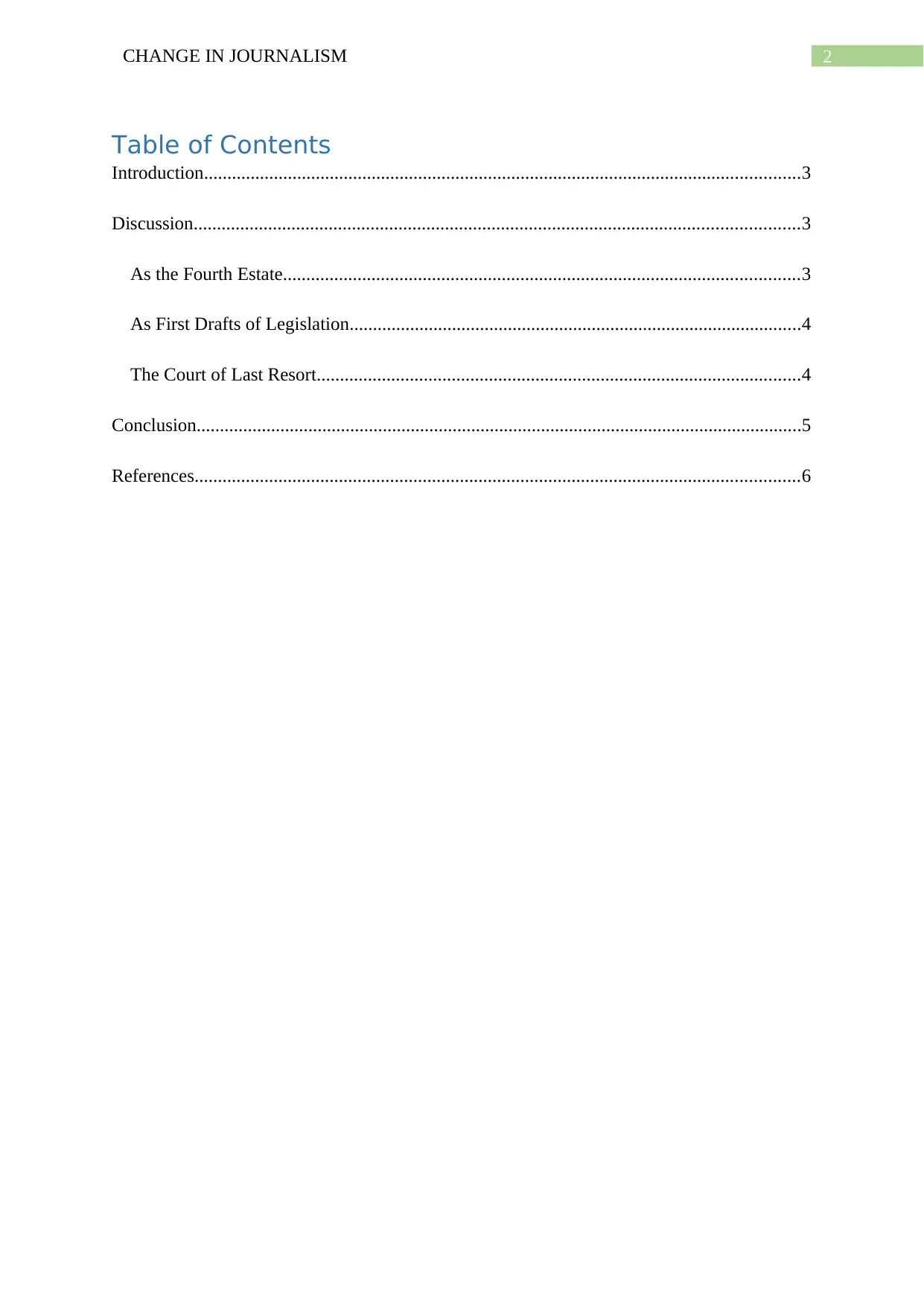
2CHANGE IN JOURNALISM
Table of Contents
Introduction................................................................................................................................3
Discussion..................................................................................................................................3
As the Fourth Estate...............................................................................................................3
As First Drafts of Legislation.................................................................................................4
The Court of Last Resort........................................................................................................4
Conclusion..................................................................................................................................5
References..................................................................................................................................6
Table of Contents
Introduction................................................................................................................................3
Discussion..................................................................................................................................3
As the Fourth Estate...............................................................................................................3
As First Drafts of Legislation.................................................................................................4
The Court of Last Resort........................................................................................................4
Conclusion..................................................................................................................................5
References..................................................................................................................................6
⊘ This is a preview!⊘
Do you want full access?
Subscribe today to unlock all pages.

Trusted by 1+ million students worldwide
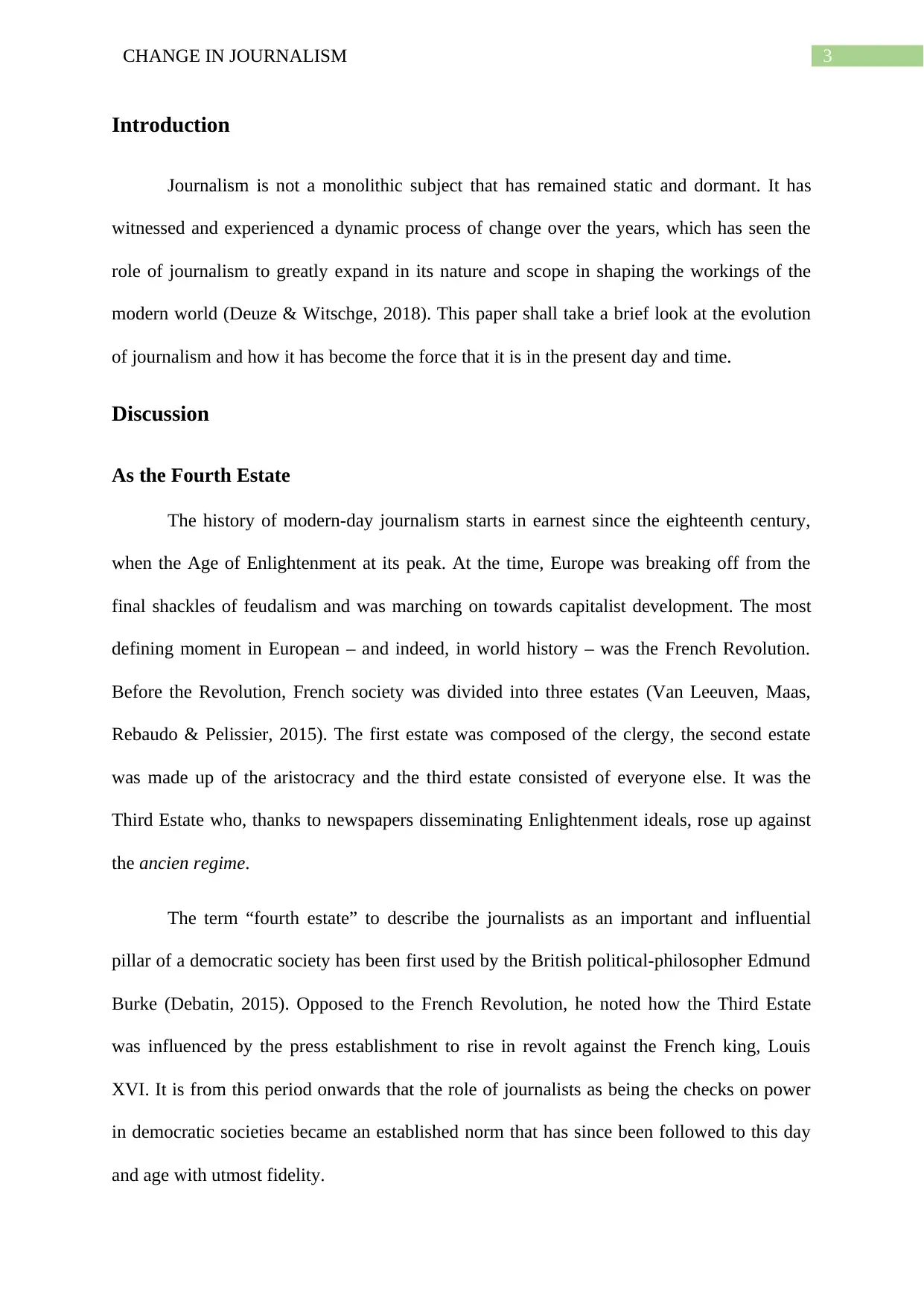
3CHANGE IN JOURNALISM
Introduction
Journalism is not a monolithic subject that has remained static and dormant. It has
witnessed and experienced a dynamic process of change over the years, which has seen the
role of journalism to greatly expand in its nature and scope in shaping the workings of the
modern world (Deuze & Witschge, 2018). This paper shall take a brief look at the evolution
of journalism and how it has become the force that it is in the present day and time.
Discussion
As the Fourth Estate
The history of modern-day journalism starts in earnest since the eighteenth century,
when the Age of Enlightenment at its peak. At the time, Europe was breaking off from the
final shackles of feudalism and was marching on towards capitalist development. The most
defining moment in European – and indeed, in world history – was the French Revolution.
Before the Revolution, French society was divided into three estates (Van Leeuven, Maas,
Rebaudo & Pelissier, 2015). The first estate was composed of the clergy, the second estate
was made up of the aristocracy and the third estate consisted of everyone else. It was the
Third Estate who, thanks to newspapers disseminating Enlightenment ideals, rose up against
the ancien regime.
The term “fourth estate” to describe the journalists as an important and influential
pillar of a democratic society has been first used by the British political-philosopher Edmund
Burke (Debatin, 2015). Opposed to the French Revolution, he noted how the Third Estate
was influenced by the press establishment to rise in revolt against the French king, Louis
XVI. It is from this period onwards that the role of journalists as being the checks on power
in democratic societies became an established norm that has since been followed to this day
and age with utmost fidelity.
Introduction
Journalism is not a monolithic subject that has remained static and dormant. It has
witnessed and experienced a dynamic process of change over the years, which has seen the
role of journalism to greatly expand in its nature and scope in shaping the workings of the
modern world (Deuze & Witschge, 2018). This paper shall take a brief look at the evolution
of journalism and how it has become the force that it is in the present day and time.
Discussion
As the Fourth Estate
The history of modern-day journalism starts in earnest since the eighteenth century,
when the Age of Enlightenment at its peak. At the time, Europe was breaking off from the
final shackles of feudalism and was marching on towards capitalist development. The most
defining moment in European – and indeed, in world history – was the French Revolution.
Before the Revolution, French society was divided into three estates (Van Leeuven, Maas,
Rebaudo & Pelissier, 2015). The first estate was composed of the clergy, the second estate
was made up of the aristocracy and the third estate consisted of everyone else. It was the
Third Estate who, thanks to newspapers disseminating Enlightenment ideals, rose up against
the ancien regime.
The term “fourth estate” to describe the journalists as an important and influential
pillar of a democratic society has been first used by the British political-philosopher Edmund
Burke (Debatin, 2015). Opposed to the French Revolution, he noted how the Third Estate
was influenced by the press establishment to rise in revolt against the French king, Louis
XVI. It is from this period onwards that the role of journalists as being the checks on power
in democratic societies became an established norm that has since been followed to this day
and age with utmost fidelity.
Paraphrase This Document
Need a fresh take? Get an instant paraphrase of this document with our AI Paraphraser
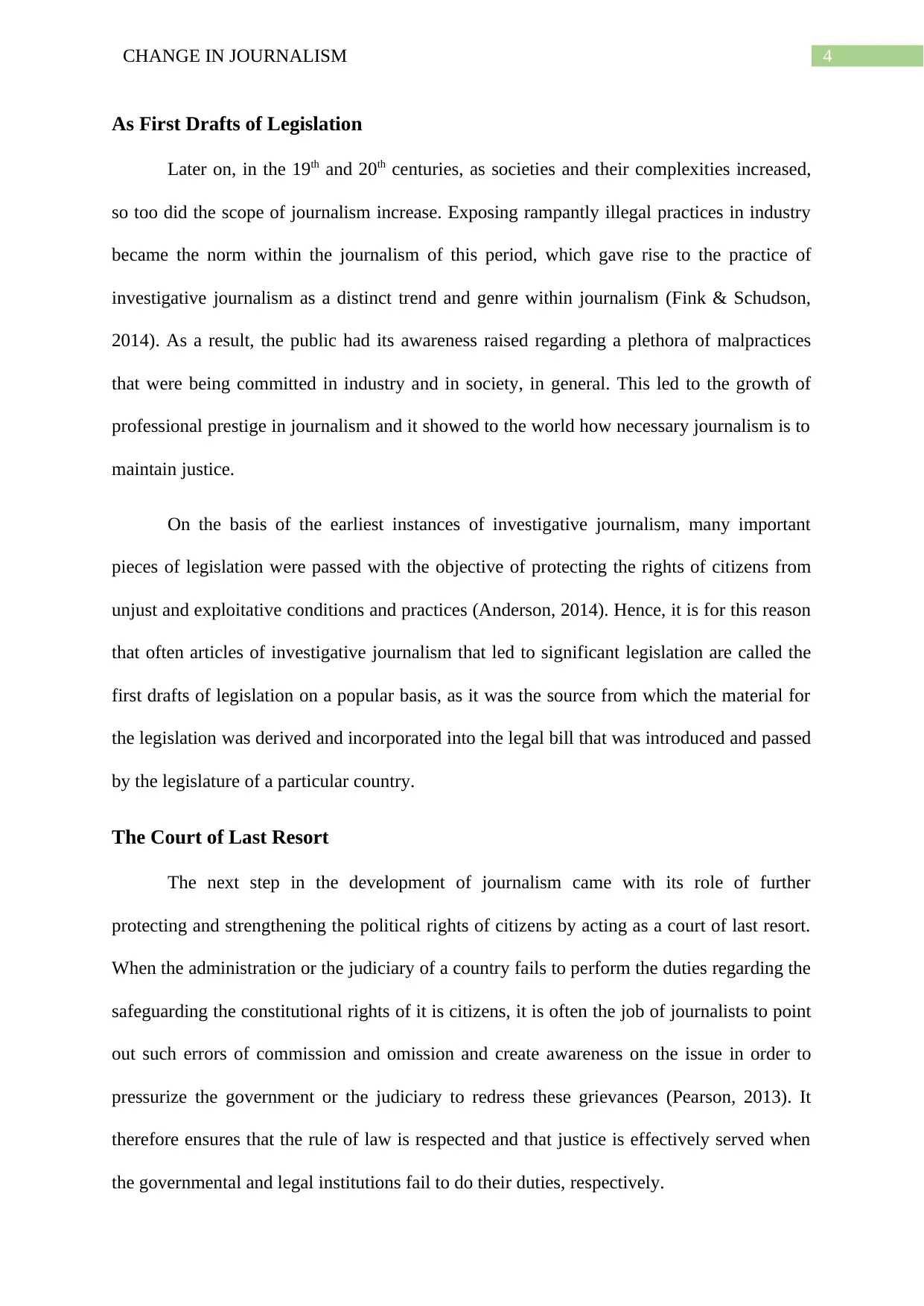
4CHANGE IN JOURNALISM
As First Drafts of Legislation
Later on, in the 19th and 20th centuries, as societies and their complexities increased,
so too did the scope of journalism increase. Exposing rampantly illegal practices in industry
became the norm within the journalism of this period, which gave rise to the practice of
investigative journalism as a distinct trend and genre within journalism (Fink & Schudson,
2014). As a result, the public had its awareness raised regarding a plethora of malpractices
that were being committed in industry and in society, in general. This led to the growth of
professional prestige in journalism and it showed to the world how necessary journalism is to
maintain justice.
On the basis of the earliest instances of investigative journalism, many important
pieces of legislation were passed with the objective of protecting the rights of citizens from
unjust and exploitative conditions and practices (Anderson, 2014). Hence, it is for this reason
that often articles of investigative journalism that led to significant legislation are called the
first drafts of legislation on a popular basis, as it was the source from which the material for
the legislation was derived and incorporated into the legal bill that was introduced and passed
by the legislature of a particular country.
The Court of Last Resort
The next step in the development of journalism came with its role of further
protecting and strengthening the political rights of citizens by acting as a court of last resort.
When the administration or the judiciary of a country fails to perform the duties regarding the
safeguarding the constitutional rights of it is citizens, it is often the job of journalists to point
out such errors of commission and omission and create awareness on the issue in order to
pressurize the government or the judiciary to redress these grievances (Pearson, 2013). It
therefore ensures that the rule of law is respected and that justice is effectively served when
the governmental and legal institutions fail to do their duties, respectively.
As First Drafts of Legislation
Later on, in the 19th and 20th centuries, as societies and their complexities increased,
so too did the scope of journalism increase. Exposing rampantly illegal practices in industry
became the norm within the journalism of this period, which gave rise to the practice of
investigative journalism as a distinct trend and genre within journalism (Fink & Schudson,
2014). As a result, the public had its awareness raised regarding a plethora of malpractices
that were being committed in industry and in society, in general. This led to the growth of
professional prestige in journalism and it showed to the world how necessary journalism is to
maintain justice.
On the basis of the earliest instances of investigative journalism, many important
pieces of legislation were passed with the objective of protecting the rights of citizens from
unjust and exploitative conditions and practices (Anderson, 2014). Hence, it is for this reason
that often articles of investigative journalism that led to significant legislation are called the
first drafts of legislation on a popular basis, as it was the source from which the material for
the legislation was derived and incorporated into the legal bill that was introduced and passed
by the legislature of a particular country.
The Court of Last Resort
The next step in the development of journalism came with its role of further
protecting and strengthening the political rights of citizens by acting as a court of last resort.
When the administration or the judiciary of a country fails to perform the duties regarding the
safeguarding the constitutional rights of it is citizens, it is often the job of journalists to point
out such errors of commission and omission and create awareness on the issue in order to
pressurize the government or the judiciary to redress these grievances (Pearson, 2013). It
therefore ensures that the rule of law is respected and that justice is effectively served when
the governmental and legal institutions fail to do their duties, respectively.
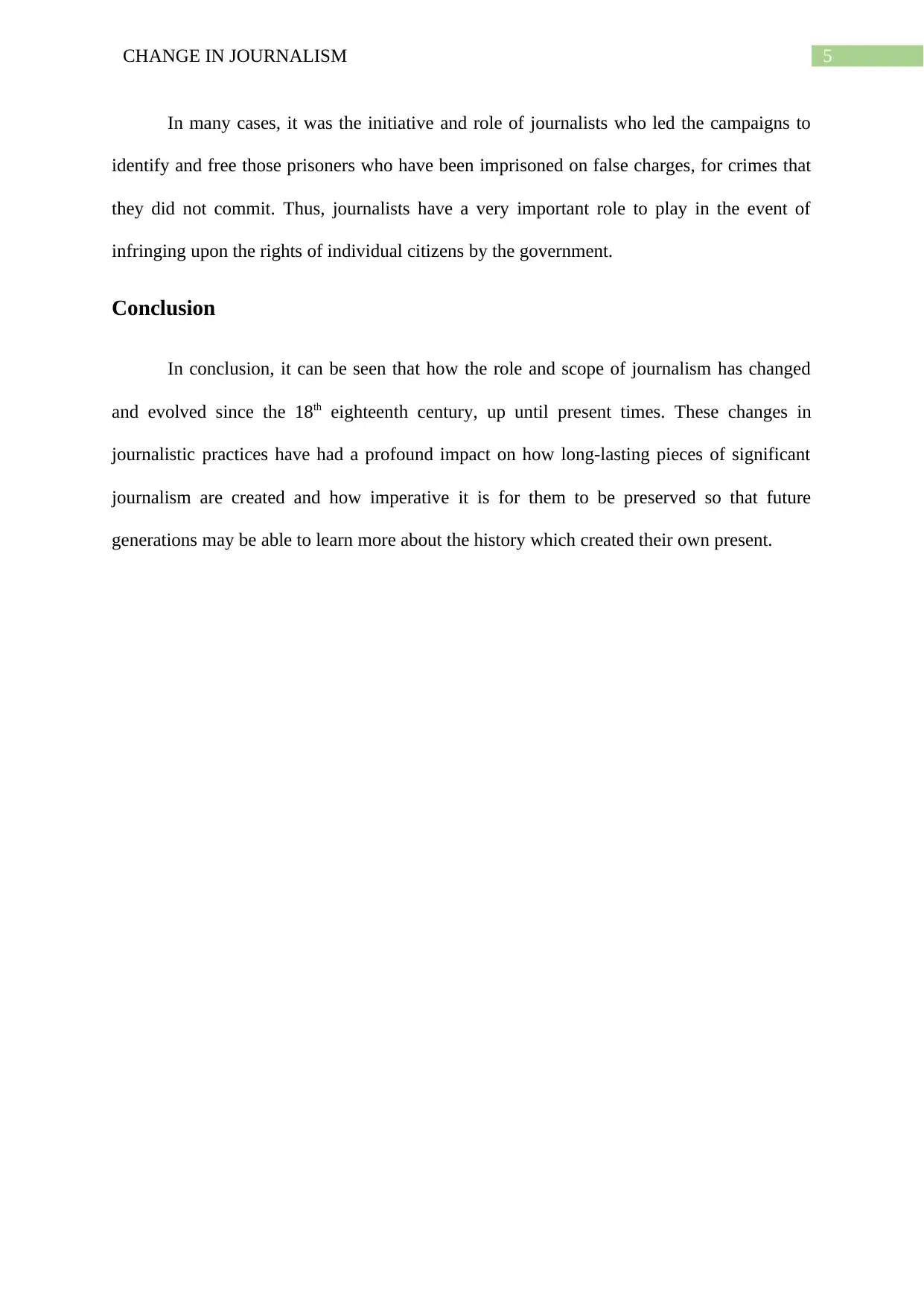
5CHANGE IN JOURNALISM
In many cases, it was the initiative and role of journalists who led the campaigns to
identify and free those prisoners who have been imprisoned on false charges, for crimes that
they did not commit. Thus, journalists have a very important role to play in the event of
infringing upon the rights of individual citizens by the government.
Conclusion
In conclusion, it can be seen that how the role and scope of journalism has changed
and evolved since the 18th eighteenth century, up until present times. These changes in
journalistic practices have had a profound impact on how long-lasting pieces of significant
journalism are created and how imperative it is for them to be preserved so that future
generations may be able to learn more about the history which created their own present.
In many cases, it was the initiative and role of journalists who led the campaigns to
identify and free those prisoners who have been imprisoned on false charges, for crimes that
they did not commit. Thus, journalists have a very important role to play in the event of
infringing upon the rights of individual citizens by the government.
Conclusion
In conclusion, it can be seen that how the role and scope of journalism has changed
and evolved since the 18th eighteenth century, up until present times. These changes in
journalistic practices have had a profound impact on how long-lasting pieces of significant
journalism are created and how imperative it is for them to be preserved so that future
generations may be able to learn more about the history which created their own present.
⊘ This is a preview!⊘
Do you want full access?
Subscribe today to unlock all pages.

Trusted by 1+ million students worldwide
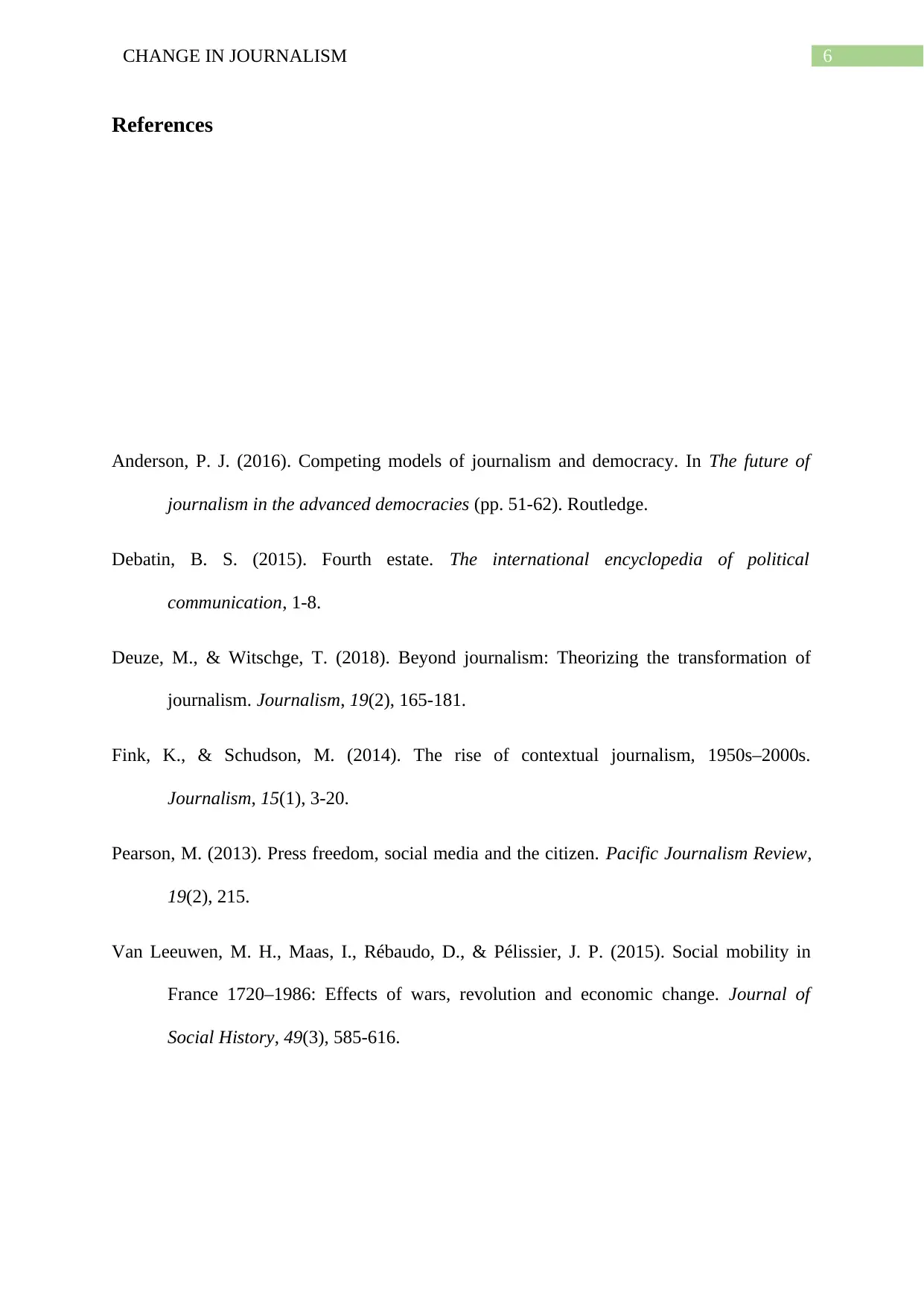
6CHANGE IN JOURNALISM
References
Anderson, P. J. (2016). Competing models of journalism and democracy. In The future of
journalism in the advanced democracies (pp. 51-62). Routledge.
Debatin, B. S. (2015). Fourth estate. The international encyclopedia of political
communication, 1-8.
Deuze, M., & Witschge, T. (2018). Beyond journalism: Theorizing the transformation of
journalism. Journalism, 19(2), 165-181.
Fink, K., & Schudson, M. (2014). The rise of contextual journalism, 1950s–2000s.
Journalism, 15(1), 3-20.
Pearson, M. (2013). Press freedom, social media and the citizen. Pacific Journalism Review,
19(2), 215.
Van Leeuwen, M. H., Maas, I., Rébaudo, D., & Pélissier, J. P. (2015). Social mobility in
France 1720–1986: Effects of wars, revolution and economic change. Journal of
Social History, 49(3), 585-616.
References
Anderson, P. J. (2016). Competing models of journalism and democracy. In The future of
journalism in the advanced democracies (pp. 51-62). Routledge.
Debatin, B. S. (2015). Fourth estate. The international encyclopedia of political
communication, 1-8.
Deuze, M., & Witschge, T. (2018). Beyond journalism: Theorizing the transformation of
journalism. Journalism, 19(2), 165-181.
Fink, K., & Schudson, M. (2014). The rise of contextual journalism, 1950s–2000s.
Journalism, 15(1), 3-20.
Pearson, M. (2013). Press freedom, social media and the citizen. Pacific Journalism Review,
19(2), 215.
Van Leeuwen, M. H., Maas, I., Rébaudo, D., & Pélissier, J. P. (2015). Social mobility in
France 1720–1986: Effects of wars, revolution and economic change. Journal of
Social History, 49(3), 585-616.
Paraphrase This Document
Need a fresh take? Get an instant paraphrase of this document with our AI Paraphraser

7CHANGE IN JOURNALISM
1 out of 8
Your All-in-One AI-Powered Toolkit for Academic Success.
+13062052269
info@desklib.com
Available 24*7 on WhatsApp / Email
![[object Object]](/_next/static/media/star-bottom.7253800d.svg)
Unlock your academic potential
Copyright © 2020–2026 A2Z Services. All Rights Reserved. Developed and managed by ZUCOL.
